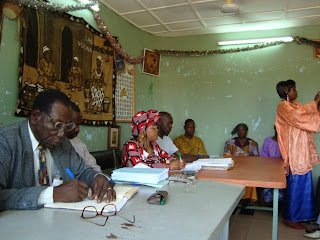
Sudanese style, mud-brick Grande Mosque of Bobo
Firstly, I had the chance to glimpse into Burkinabe reality interviewing around 15 women politicians about their involvement, the situation in the country and the most difficult part - solutions to some of its urgent problems. Whereas technically speaking there is not always a reason for optimism, there is something reassuring about seeing women from such diverse cultures, religions, ethnic groups that in recent months have learned to work together after a long period when they thought that being in diffrent parties implies not saying hello to each other. The opposition parties in Burkina are very divided. Whereas the strongest party holds 73 seats out of 111 in the General Assembly, around 70% of local elected positions and its members seem to benefit from its strong network, the opposition parties spring up (and disappear) like mushrooms given that there are hardly any formal prerequisites and that basically everybody can found a new party tomorrow. Similar constellations can be found in other African countries (and probably not only African), where the rulling party can benefit from the lack of hurdles for opposition parties to emerge. (Ever complained about 5% hurdle to enter the parliament or the prerequisite of having a few thousand signatures to found a poltical party?) This does not make it easier for women to get involved. Apart from the usual obstacles they are facing (household duties - which for many means as much as the necesity of ORGANIZING food for their kids every day, lower education levels, including analphabetism, husbands not wanting a wife politician, some of them consequently enough to demand divorce), they have a high chance of being in a party opposite to their fathers, uncles, brothers etc. if they decide to chose their party freely.
The Domes of Fabedougou - about 1.8 bln years old

Karfiguela Falls close to Banfora
Apart from wonderfull landscapes, the life music omnipresent in Bobo is certainly one of the attractions. Watching lively, fun concerts, great dancers, whether from the band or clients getting up to give an occasional show of their incredible dancing talents, I was asking myself why I did think of Burkina mainly in terms of the poor socioeconomic situation of its people.
The last several days I've spent in Bobo Dioulasso - the second largest city in Burkina - have been full of discoveries.
Firstly, I had the chance to glimpse into Burkinabe reality interviewing around 15 women politicians about their involvement, the situation in the country and the most difficult part - solutions to some of its urgent problems. Whereas technically speaking there is not always a reason for optimism, there is something reassuring about seeing women from such diverse cultures, religions, ethnic groups that in recent months have learned to work together after a long period when they thought that being in diffrent parties implies not saying hello to each other. The opposition parties in Burkina are very divided. Whereas the strongest party holds 73 seats out of 111 in the General Assembly, around 70% of local elected positions and its members seem to benefit from its strong network, the opposition parties spring up (and disappear) like mushrooms given that there are hardly any formal prerequisites and that basically everybody can found a new party tomorrow. Similar constellations can be found in other African countries (and probably not only African), where the rulling party can benefit from the lack of hurdles for opposition parties to emerge. (Ever complained about 5% hurdle to enter the parliament or the prerequisite of having a few thousand signatures to found a poltical party?) This does not make it easier for women to get involved. Apart from the usual obstacles they are facing (household duties - which for many means as much as the necesity of ORGANIZING food for their kids every day, lower education levels, including analphabetism, husbands not wanting a wife politician, some of them consequently enough to demand divorce), they have a high chance of being in a party opposite to their fathers, uncles, brothers etc. if they decide to chose their party freely.
The Domes of Fabedougou - about 1.8 bln years old

Karfiguela Falls close to Banfora
Village of Koro
Second, I had a chance to be just a tourist, travelling with a friendly, knowledgable guide (great unwanted-attention repellent) and visiting beautiful and interesting places, benefiting from the fact that many of Burkina's touristic attractions are so far attracting far too little tourist.
Apart from wonderfull landscapes, the life music omnipresent in Bobo is certainly one of the attractions. Watching lively, fun concerts, great dancers, whether from the band or clients getting up to give an occasional show of their incredible dancing talents, I was asking myself why I did think of Burkina mainly in terms of the poor socioeconomic situation of its people.
So what is Burkina? Kids begging for money and some 12% literacy rate or the concerts full of talent, dignity and power? Or: how to grasp both sides of the reality?



































